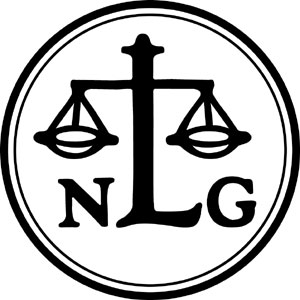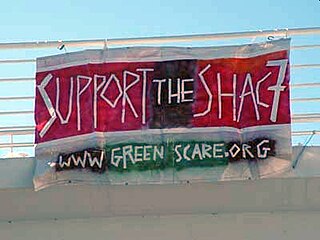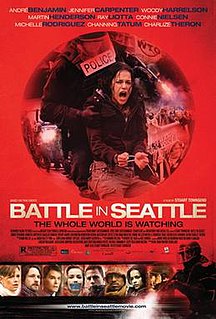Related Research Articles

The Independent Media Center is an open publishing network of activist journalist collectives that report on political and social issues. Beginnings were made in London and Sydney during the 1999 Carnival Against Capital then the first Indymedia Media Center was founded to report on the protests against the World Trade Organisational Ministerial Conference in Seattle. Indymedia became closely associated with the global justice movement, which criticized neo-liberalism and its associated institutions.

A black bloc is a tactic used by protesters who wear black clothing, ski masks, scarves, sunglasses, motorcycle helmets with padding, or other face-concealing and face-protecting items. The clothing is used to conceal wearers' identities and hinder criminal prosecution by making it difficult to distinguish between participants. It is also used to protect their faces and eyes from pepper spray, which is used by police during protests or civil unrest. The tactic allows the group to appear as one large unified mass. Black bloc participants are often associated with anarchism, anarcho-communism, communism, libertarian socialism, antifascism, or the anti-globalization movement.

Anti-Racist Action (ARA), also known as the Anti-Racist Action Network, is a decentralised network of militant far-left political cells in the United States and Canada. Originating during the 1980s, the ARA Network stopped using the name in 2013. The main purpose of the network was to engage in direct action and doxxing against rival political organisations on the hard right to dissuade them from further involvement in political activities. Anti-Racist Action described these such groups as racist, fascist, or both. Most members associated with ARA have been adherents to anarchism, but also some Trotskyism and Maoism.

The National Lawyers Guild (NLG) is a progressive public interest association of lawyers, law students, paralegals, jailhouse lawyers, law collective members, and other activist legal workers, in the United States. The group was founded in 1937 as an alternative to the American Bar Association (ABA) in protest of that organization's exclusionary membership practices and conservative political orientation. They were the first US bar association to allow the admission of minorities to their ranks. The group sought to bring more lawyers closer to the labor movement and progressive political activities, to support and encourage lawyers otherwise "isolated and discouraged," and to help create a "united front" against Fascism.

Bernardine Rae Dohrn is a retired law professor and a former leader of the radical Weather Underground. As a leader of the Weather Underground in the early 1970s, Dohrn was on the FBI's 10 Most Wanted list for several years. She remained a fugitive, even though she was removed from the list. After coming out of hiding in 1980, Dohrn pleaded guilty to misdemeanor charges of aggravated battery and bail jumping.
Direct Action Network (DAN) was a North American confederation of anti-corporate, anti-authoritarian and anarchist affinity groups, collectives, and organizations. It grew out of the Seattle chapter which had been formed to coordinate the nonviolent civil disobedience portion of the anti-WTO mobilization in Seattle in 1999.
Anarchism in the United States began in the mid-19th century and started to grow in influence as it entered the American labor movements, growing an anarcho-communist current as well as gaining notoriety for violent propaganda of the deed and campaigning for diverse social reforms in the early 20th century. By around the start of the 20th century, the heyday of individualist anarchism had passed and anarcho-communism and other social anarchist currents emerged as the dominant anarchist tendency.

The Green Scare is legal action by the US government against the radical environmental movement. It alludes to the Red Scares, periods of fear over communist infiltration of US society.

The anarchist philosophical and political movement has some connections to elements of the animal liberation movement. Many anarchists are vegetarian or vegan and have played a role in combating perceived injustices against animals. They usually describe the struggle for the liberation of non-human animals as a natural outgrowth of the struggle for human freedom.

Battle in Seattle is a 2007 political action-thriller film written and directed by Stuart Townsend, in his directorial debut. The story is loosely based on the protest activity at the WTO Ministerial Conference of 1999. The film premiered on May 22, 2008 at the Seattle International Film Festival.
The Weiquan movement is a non-centralized group of lawyers, legal experts, and intellectuals in China who seek to protect and defend the civil rights of the citizenry through litigation and legal activism. The movement, which began in the early 2000s, has organized demonstrations, sought reform via the legal system and media, defended victims of human rights abuses, and written appeal letters, despite opposition from Communist Party authorities. Among the issues adopted by Weiquan lawyers are property and housing rights, protection for AIDS victims, environmental damage, religious freedom, freedom of speech and the press, and defending the rights of other lawyers facing disbarment or imprisonment.
Contemporary anarchism within the history of anarchism is the period of the anarchist movement continuing from the end of World War II and into the present. Since the last third of the 20th century, anarchists have been involved in anti-globalisation, peace, squatter and student protest movements. Anarchists have participated in violent revolutions such as in the Free Territory and Revolutionary Catalonia and anarchist political organizations such as the International Workers' Association and the Industrial Workers of the World exist since the 20th century. Within contemporary anarchism, the anti-capitalism of classical anarchism has remained prominent.
People's Law Office (PLO) is a law office in Chicago, Illinois, which focuses on public interest law, representing clients believed to have been the subject of attacks by governmental officials and agencies. It was founded in 1969. Clients have included political activists, people who have been wrongfully arrested and imprisoned, or subjected to excessive force; and criminal defendants.

Alter-globalization is a social movement whose proponents support global cooperation and interaction, but oppose what they describe as the negative effects of economic globalization, considering it to often work to the detriment of, or not adequately promote, human values such as environmental and climate protection, economic justice, labor protection, protection of indigenous cultures, peace and civil liberties.

The anti-globalization movement, or counter-globalization movement, is a social movement critical of economic globalization. The movement is also commonly referred to as the global justice movement, alter-globalization movement, anti-globalist movement, anti-corporate globalization movement, or movement against neoliberal globalization.

Direct action originated as a political activist term for economic and political acts in which the actors use their power to directly reach certain goals of interest; in contrast to those actions that appeal to others ; by, for example, revealing an existing problem, using physical violence, highlighting an alternative, or demonstrating a possible solution.

Riseup is a volunteer-run collective providing secure email, email lists, a VPN service, online chat, and other online services. This organization was launched by activists in Seattle with borrowed equipment and a few users in 1999 or 2000, and quickly grew to millions of accounts.
Antifa is a left-wing anti-fascist and anti-racist political movement in the United States. It is highly decentralized and comprises an array of autonomous groups that aim to achieve their objectives through the use of both nonviolent and violent direct action rather than through policy reform. Much of antifa political activism is nonviolent, involving poster and flyer campaigns, mutual aid, delivering speeches, marching in protest, and community organizing. They also engage in protest tactics, seeking to combat fascists and racists such as neo-Nazis, white supremacists, and other far-right extremists, and differing from other leftist opposition movements by their willingness to directly confront far-right activists, and in some cases law enforcement. This may involve digital activism, doxing, harassment, physical violence, and property damage against those whom they identify as belonging to the far right.
Katya Komisaruk is an American civil rights lawyer and social justice activist. She attended Harvard Law School, helped form the Midnight Special Law Collective and Just Cause Law Collective.

Showdown in Seattle: Five Days That Shook the WTO is a 1999 documentary film, first broadcast in daily half-hour installments, about the November 1999 protests against the Ministerial Conference of the World Trade Organization (WTO) in Seattle, Washington.
References
- 1 2 Phaedra Travis, Sarah Coffey and Paul Marini, "Wrenching the Bench People's Law Collectives and the Movement" Archived 2011-07-27 at the Wayback Machine , The Earth First! Journal , Tucson, AZ, Beltane 2002. Retrieved on 2010-03-12.
- ↑ "Student Lawyer". Law Student Division, American Bar Association. 4 June 1980. Retrieved 4 June 2018– via Google Books.
- ↑ "The San Francisco Attorney". Bar Association of San Francisco. 4 June 2018. Retrieved 4 June 2018– via Google Books.
- 1 2 3 4 5 Wabun Wind, The people's lawyers (New York, Holt, Rinehart and Winston (1973 1st ed.) ( ISBN 0030010411)
- ↑ "Editorial Comment Log". State Bar of California. 4 June 1971. Retrieved 4 June 2018– via Google Books.
- ↑ Pulido, Laura (4 June 2018). Black, Brown, Yellow, and Left: Radical Activism in Los Angeles. University of California Press. ISBN 9780520245204 . Retrieved 4 June 2018– via Google Books.
- ↑ "A Short History of the NLG's Cuba Solidarity Work". Nlginternational.org. 12 October 2015. Retrieved 4 June 2018.
- ↑ Swearingen, M. Wesley (4 June 1995). FBI Secrets . South End Press. p. 76 . Retrieved 4 June 2018– via Internet Archive.
bar sinister.
- ↑ "Activist Video Archive". Activistvideoarchive.org. Retrieved 4 June 2018.
- ↑ "People's Law Office » AREA Chicago". Areachicago.org. 8 January 2012. Retrieved 4 June 2018.